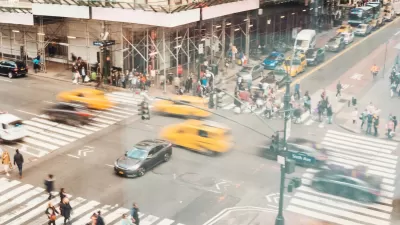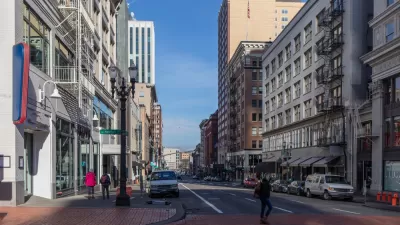Former Toronto Planning Director Jennifer Keesmaat is responding to rising pedestrian and bike fatalities in the "Vision Zero" city with a series of calls for action.

Former Toronto Planning Director Jennifer Keesmaat has been blasting Toronto's approach to traffic safety through a variety of media channels, provoking some backlash.
First, Keesmaat told Toronto Star reporters David Rider and Samantha Beattie that a "state of emergency" was necessary to treat the city's traffic fatalities as a high priority for investment in the public realm.
The Star has completed its own analysis of traffic fatalities in the city, producing a discrepancy with Toronto Police Department figures, because "Toronto police traffic fatality figures are lower because they do not include those on private property or 400-series highways in Toronto," according to the article. The Star counts 41 pedestrian deaths in 2017, with 18 so far this year. The Star also counts four cyclist fatalities so far this year.
Keesmaat followed up those statements by writing an opinion piece for The Guardian. There, Keesmaat repeats the language about a state of emergency and questions the wisdom of a century of designing urban areas to suit quick travel in cars.
Two fundamentally contradictory visions are bumping up against each other. In the old model, if driving is the key to freedom, then cyclists and pedestrians need to get out of the way. They are audacious, misplaced and – even worse – entitled. Who and what are streets for, anyway? They are places to get through, and fast. Lowering speed limits to ensure pedestrians are safe makes no sense.
In the new model, however, streets aren’t just for getting through – they are places in their own right, designed for people, commerce, lingering and life. It’s the people, the human activity, that should come first. Cycling isn’t just for radicals and recreation, and lower speed limits make sense: they protect and enhance quality of city life...
Keesmaat's round of media coverage provoked a response from the Editorial Board of the Toronto Sun, which accuses Keesmaat of reigniting the "War on Cars," and failing to grasp the reality of transportation for the majority of Toronto residents.
The Toronto Star is providing regular traffic safety coverage with its "Deadly Streets" series.
FULL STORY: ‘It’s time to declare a state of emergency’: Anger, calls for change follow deaths on Toronto streets

Alabama: Trump Terminates Settlements for Black Communities Harmed By Raw Sewage
Trump deemed the landmark civil rights agreement “illegal DEI and environmental justice policy.”

Study: Maui’s Plan to Convert Vacation Rentals to Long-Term Housing Could Cause Nearly $1 Billion Economic Loss
The plan would reduce visitor accommodation by 25% resulting in 1,900 jobs lost.

Planetizen Federal Action Tracker
A weekly monitor of how Trump’s orders and actions are impacting planners and planning in America.

Wind Energy on the Rise Despite Federal Policy Reversal
The Trump administration is revoking federal support for renewable energy, but demand for new projects continues unabated.

Passengers Flock to Caltrain After Electrification
The new electric trains are running faster and more reliably, leading to strong ridership growth on the Bay Area rail system.

Texas Churches Rally Behind ‘Yes in God’s Back Yard’ Legislation
Religious leaders want the state to reduce zoning regulations to streamline leasing church-owned land to housing developers.
Urban Design for Planners 1: Software Tools
This six-course series explores essential urban design concepts using open source software and equips planners with the tools they need to participate fully in the urban design process.
Planning for Universal Design
Learn the tools for implementing Universal Design in planning regulations.
Caltrans
Smith Gee Studio
Institute for Housing and Urban Development Studies (IHS)
City of Grandview
Harvard GSD Executive Education
Toledo-Lucas County Plan Commissions
Salt Lake City
NYU Wagner Graduate School of Public Service




























